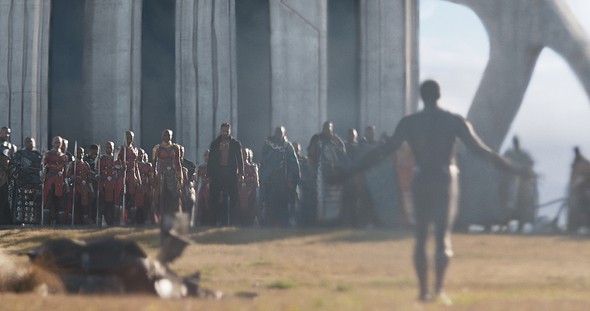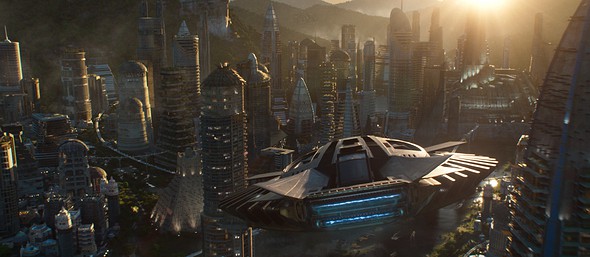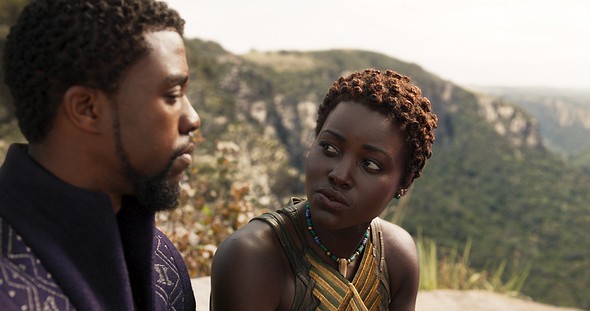Wakanda, the New Black Homeland
Paul Kersey, American Renaissance, February 16, 2018
James Baldwin, perhaps the most influential black literary figure of the last century, confessed in Notes of a Native Son that blacks feel alienated and inferior no matter where they travel in the modern world. Each black person, he mourned, is but a “stranger in their village,” a global village shaped by others — especially by whites.
He wrote:
For this village, even were it incomparably more remote and incredibly more primitive, is the West, the West onto which I have been so strangely grafted. These people cannot be, from the point of view of power, strangers anywhere in the world; they have made the modern world, in effect, even if they do not know it. The most illiterate among them is related, in a way that I am not, to Dante, Shakespeare, Michelangelo, Aeschylus, da Vinci, Rembrandt, and Racine; the cathedral at Chartres says something to them which it cannot say to me, as indeed would New York’s Empire State Building, should anyone here ever see it. Out of their hymns and dances come Beethoven and Bach. Go back a few centuries and they are in their full glory — but I am in Africa, watching the conquerors arrive. (Notes of a Native Son, p. 164)
Despite the rantings of Afrocentrists, Baldwin’s heartfelt confession is an honest analysis of the impact of race on world history, an assessment you will never hear from any person in power today, whether white or black. The uncomfortable truth is that the civilization created by whites that dominates the globe was built independently of black people.
But in today’s media culture, image is reality. Thus, the mainstream media is attempting to reverse Baldwin’s reflections on real world history via the fantasy land of Wakanda, and the massive marketing campaign for the new film Black Panther. Wakanda represents a spiritual homeland for blacks everywhere, a fantastical balm designed to soothe black self-esteem and emotionally support a people alienated from the world whites created.
The size of this effort should not be underestimated. The film now holds an astonishing 98 percent favorable rating at Rotten Tomatoes, a site that aggregates professional critics’ reviews. This latest Marvel Cinematic Universe movie put out by Disney boasts a black director, an almost all-black cast, a $200 million production budget and a $150 million marketing budget to create and promote the fictional African kingdom of Wakanda, almost as if it could have been real. The film is also benefiting from an incalculable amount of earned media, as journalists and activists are eager to promote the pro-black themes of the film.
The explicitly Identitarian message has been highlighted in almost every review. For example, Kareem Abdul-Jabbar, writing in the Hollywood Reporter, wrote:
It’s a little like witnessing the unveiling of an enormous statue on the public square — with the public square being the world — of Rosa Parks, Martin Luther King Jr., Malcolm X and Nelson Mandela dressed in bright dashikis. It’s an homage to who we were, a celebration of who we are and an inspiration for what we hope to become.
Ryan Coogler, the black director of the film, noted in the same piece that Wakanda serves as wish fulfillment for blacks. “I think that Wakanda is the ultimate African fantasy, a place that was able to maintain dominion over their natural resource, able to control it, able to use it to grow, scientifically and culturally, and able to defend it from people who want to take it,” he said.
The ecstatic response from blacks shows that this appeal to racial pride is a huge success. Black people all across America are holding parties and seeing the movie in large groups. The character of Black Panther is being interpreted as an avatar of global black identity.

Credit Image: © Marvel Studios/Entertainment Pictures/ZUMAPRESS.com
This is intended. Reginald Hudlin, a black scriptwriter in Hollywood, wrote a celebrated reimaging of the Black Panther in the mid-2000s. He placed the blackness of Wakanda front and center, using the advanced and powerful African kingdom as a means to combat negative stereotypes of the Dark Continent.
Hudlin explained his agenda in an essay at the end of the graphic novel “Who is the Black Panther?” He wrote:
The Black Panther is the Black Captain America. He’s the embodiment of the ideals of a people. As Americans, we feel good when we read Captain America because he reminds us of the potential of how good America can be, if, of course, we have the convictions to live by the principles the country was founded on. As a black person, the Black Panther should present the fulfillment of the potential of the Motherland.
After all, he’s a Wakandan. Wakandans are so bad@ss THEY’VE NEVER BEEN CONQUERED. Not only does Wakanda’s independence block the total dominance of Africa by colonial powers, its cultural evolution has gone unchecked for centuries. They were ahead of us a thousand years ago. And no one has colonized them, burned their books, erased their language, or broken their spirits.
Unfettered by the yoke of colonization, they have created a hi-tech, ecologically wound paradise that makes the rest of the world seem primitive by comparison. If the right company got their hands on their gadgets, their medicines, their R&D, they would vault themselves a century ahead of their competitors.
[“The Black Panther: A Historical Overview and a Look to the Future,” by Reginald Hudlin]
As the New York Times admits, part of the new film’s “emotional and visual appeal lies in the fact that Wakanda has never been colonized.” It thus serves a psychological dual purpose by reversing the real world history of contact between African and Western civilization and providing a powerful mythology about what blacks could accomplish without white interference.
The fantasy of Wakanda banishes the depressing reality of Haiti, Zimbabwe, and Liberia. Instead, it provides an almost religious sense of empowerment for blacks eager to believe they are descended from royalty, retroactively turning them into the “conquerors” from Baldwin’s reflections.

Wakanda (Credit Image: © Marvel Studios/Entertainment Pictures/ZUMAPRESS.com)
For example, Leonard Pitts Jr. claimed Black Panther deconstructs the concept of race, even as he gushed about how it gave him a powerful feeling of connectedness with his racial kinsmen:
Somehow, director Ryan Coogler has managed to capture on film an African Eden, a Wakanda that is not simply a place but a way of being, the remembrance of a time when we were enough for us — a time not simply without racism, but without race. A time when you could simply stand and be. . . . .
If you’ve ever had the experience of being African American in Africa, perhaps you know the feeling, that stirring in your chest when you look around and realize that every face is like yours — the airline pilot, the woman selling palm oil, the man lying in the gutter, the dusty, bare-chested children playing soccer on a dirt street — all of them, you.
For the first time in your life, color is not a determinative thing. It feels like breathing after you’ve been underwater too long, resting after a 20-mile hike.
The memory — and hope — of that feeling is what people are really buying out movie theaters to see. Yes, they say they are doing it because they want black children to understand that they, too, can be superheroes and that they want girls in particular to know that they can be warriors, scientists and queens.

Credit Image: © Marvel Studios/Entertainment Pictures/ZUMAPRESS.com
In reality, Wakanda itself, like almost everything else in the modern world, was a creation of white guys, Jack Kirby and Stan Lee. But myth is often more important than reality. And in the mythic sense, if Wakanda is the African Garden of Eden, whites become a stand-in for Satan, triggering Africans’ fall from superiority into subjugation.
Indeed, while Black Panther champions a message of independence and self-reliance for blacks, some journalists argue it should inspire a feeling of guilt and shame in whites. For example, the Washington Post’s Ann Hornaday argued one reaction to the film should be “tears . . . of grief.”
She wrote:
[J]ust as palpable as the celebratory joy and sheer artistry that define Black Panther, there lies an unspoken absence, the costs of which are no less real for being diffuse and virtually unfathomable. The lush Afro-centric iconography on screen underlines just how constricted those images have been throughout most of American cinematic history, at enormous cost not just to African American spectators, but white ones deprived of untold visual and narrative riches.
It seems likely Black Panther will be eventually incorporated into school curriculums as a form of cultural reparations, teaching young Americans what Africa would have looked like were it not for European interference. Some public school students are already getting advance screenings of the film. This attempt to boost the already unrealistically high self-esteem of blacks is likely to be effective. Unfortunately, it will also fuel the pathological sense of grievance blacks have against white people for supposedly creating all of their problems.
It’s hard not to see this as intentional. James Baldwin knew even the most illiterate white person was related to Dante, Shakespeare, Michelangelo, Aeschylus, da Vinci, Rembrandt, and Racine in a way he never could be. But now blacks have been given an attractive myth, being told they are honorary citizens of Wakanda in a way whites can never be. And as blacks are provided a fantasy of power and success, our own people are indoctrinated to feel shame and guilt about the deeds our ancestors actually accomplished.















